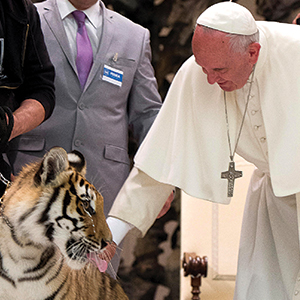Speaking in London last Friday at Heythrop College, the Syrian Catholic Archbishop of Mosul and Erbil, Boutros Moshe, echoed Woody Guthrie. “That land is our land!” he intoned. “We did not take it through invasion or war. We are peaceful people, accepting even less than what is fair. The land was ours even before Islam started. It is very, very dear to us. It carries our common heritage from our ancestors. We have watered it with our sweat and our blood. We witness to Jesus Christ. And this land is our land.”
In 1940 Guthrie sang of the land between California and New York Island as “your land [and] my land”. Moshe was speaking of the city of Mosul and the Nineveh Plains of Iraq. Guthrie saw America’s poor standing “by the Relief Office … hungry”. But Moshe witnessed and testified to a worse fate for his people than anything even the Great Depression visited on Americans.
To make his people leave their land, Islamic State (IS) first slaughtered large numbers – starting with leaders and professionals – to ensure the rest would flee for their lives. Anyone remaining had to convert to Islam; pay the jizya tax (which implies submission to Muslim rule and is a form of slavery, Moshe pointed out); or they could leave; or they could die.
Refusing to convert or submit to slave status, Moshe’s Christians have been given a safe haven in Iraqi Kurdistan. The archbishop wants their stolen land liberated and restored; and an administration in Iraq that is strong enough to give “clear constitutional guarantees” to the country’s minorities. Kurdistan villagers “opened their hearts and their houses to give us hospitality”, Moshe acknowledged, also expressing gratitude to NGOs such as Aid to the Church in Need, to the Pope and the church organisations who supported them. “We would have been eaten alive by the beasts of this land without their help,” he said.
Twelve thousand refugee families making up 52,000 people were accommodated. Over the past two years, schools and colleges have been set up, educating 9,600 students. Mass is celebrated 14 times every Sunday in local churches or “caravan” (temporary) churches built for the displaced. The numbers in the camps, however, are falling, with perhaps only 30,000 remaining. “One day we will all leave if liberation is delayed, if we are not completely liberated and given a life of dignity, rights and security,” Moshe warned.
The archbishop pointed out that his diocese makes up a third of all Syrian Catholics. If the expulsion is allowed to stand “we may not lose our Catholic faith, but we will lose all that links us to our history, civilisation, Catholic heritage and tradition. Our Syrian Catholic identity will be extinct. We are talking of genocide in the full meaning of the word.”
Archbishop Moshe hoped that the coalition forces attempting to counter IS would be “even more serious” and “increase the speed of liberation without damaging people or towns or cities”.
And he offered a warning to the West: “Islamic State is coming to you with all its poison. You are the blasphemers. In their mind they are coming to destroy your blasphemy. They want to convert you to their ideology, which is opposed to civilisation and human dignity.”
He ended with a plea for the coalition to speed up the liberation of Mosul, and a paean to what is lost when Christians are expelled from the region. “Our civilisation is a great witness to our integrity and our roots,” he said. “We are proud of our land and all it has given us. With every bit of soil from our land one can smell the blood of our ancestors. We are the Church of the martyrs. We are proud of our martyrs and our witness to Jesus Christ.”
The archbishop was addressing a conference on “Christianity in the Middle East Today: Present challenges and future perspectives” organised by the Centre for Eastern Christianity, Heythrop College and the Living Stones of the Holy Land Trust along with the Centre for World Christianity, School of Oriental and African Studies, University of London. Thanking Archbishop Moshe, Anthony O’Mahony, Centre for Eastern Christianity director, said he was particularly struck by the point that IS opposes human dignity, and is bent on destroying other civilisations.
23 June 2016, The Tablet
Moshe demands liberation of Christian lands
 Loading ...
Loading ...
Get Instant Access
Subscribe to The Tablet for just £7.99
Subscribe today to take advantage of our introductory offers and enjoy 30 days' access for just £7.99

